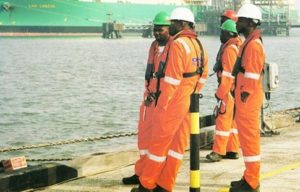
The Diplomatic Conference held in Manila, Philippines in 2010 saw the emergence of the 2010 Manila Amendments to the International Convention on Standards of Training, Certification and Watchkeeping for Seafarers, 1978 and the Seafarers’ Training, Certification and Watchkeeping Code. A notable outcome of that conference is the designation of 25th of Juneas the annual day for the commemoration seafarers worldwide.According to the International Maritime Organisation, (IMO) the maritime industry is responsible for nearly 90 per cent of the world’s trade;and seafarers are mostly responsible for the operations of ships and the safe delivery of cargoes across the ocean. The contribution of seafarers to the maritime industry and the world economy cannot be overemphasised. These heroes continually sacrifice a lot for the sustenance of international trade and should be celebrated.Nigeria also joined other countries in celebrating theday with the theme “Seafarers’ Well-Being”. In the usual manner, stakeholders in the industry maximised the opportunity to call on the authorities to pay attention to the plight of seafarers in the country. But the annual call to action, in the past, has not really attracted a major intervention by the government.
The problems of Nigerian seafarers are known to stakeholders in the industry. These challenges have been regurgitated over and over again. Chief amongst the challenges is the poor remuneration of Nigerian seafarers and the lowered working conditionsoffered them. Nigerian seafarers have been forced to work below the operative standards in other countries in spite of the internationalisation of standards in the industry. However, this year’s celebration coincided with a most noteworthy event that can potentially turn around the plight of the seafarers in Nigeria. The Director General of the Nigerian Maritime Administration and Safety Agency (NIMASA), Dr.DakukuPeterside announced at the “2018 Seafarers Day” celebration held in Warri, Delta State, that new conditions of service, including minimum wage for the Nigerian seafarers, would be signed on June 28, 2018. In addition he also threatened to report ship-owners who err in the contributory pension scheme to the Pension Commission for appropriate sanctions. Contrary to the usual rhetoric of the past years when proclamations are made with no action, NIMASA few days after the pronouncement signed the Nigerian Joint Industrial Council (NJIC) Collective Bargaining Agreement (CBA) with ship-owners association and seafarers union. The tripartite collective bargaining agreement addresses such issues as hiring, working conditions and dispute resolution between an employer and a union. A union as recognised by the agreement is any association that is representative of the interest of workers. The agreement stipulates minimum standards for seafarers that ship-owners must honour. The role of NIMASA in the agreement is to stand as an umpire to ensure peaceful relationship between ship-owners and the seafarers.
The agreement is a breakthrough for seafarers in Nigeria and we commend the NIMASA for this leap forward. What this means is that Nigerian seafarers now have a legally binding document that protects their interest and compels ship-owners to provide good working conditions with provision for continuous negotiations. This news has been well received by seafarers as it is seen as the beginning of a new dawn in the industry. As much as we commend Dr.DakukuPeterside for this milestone we believe a lot still needs to be done to sustain the change we desire, especially for indigenous ship-owners. The current structure makes business difficult for ship-owners and invariably stifles their income, which eventually tells on the remuneration of seafarers and other employees. How would indigenous ship-owners provide the right kind of remuneration and working conditions when they do not have a contract that can sustain their businesses? It is a known fact that indigenous ship-owners are at the mercy of foreign shipping companies who have taken over the local shipping business and are supported by all kinds of waivers. Yet the cabotage regime has done little to support ship-owners in the country. We believe now is the time for NIMASA to address the pervasive shortcomings in the maritime industry in Nigeria and address the plight of ship-owners by creating a favourable environment for them. Seafarers cannot have a better deal if the current system that stifles business for indigenous ship-owners is not reviewed. This current reality also affects the competency and employment opportunities for seafarers in the country.
Seafarers are important to the maritime business and deserve the necessary attention. The steps and pronouncements by NIMASA are laudable and have the capacity to change the current abysmal situation. However, mere rhetoric will not produce enduring progress if the country does not address the predicament of shipowners in Nigeria. The welfare of seafarers depends on the growth of the businessesof shipowners.